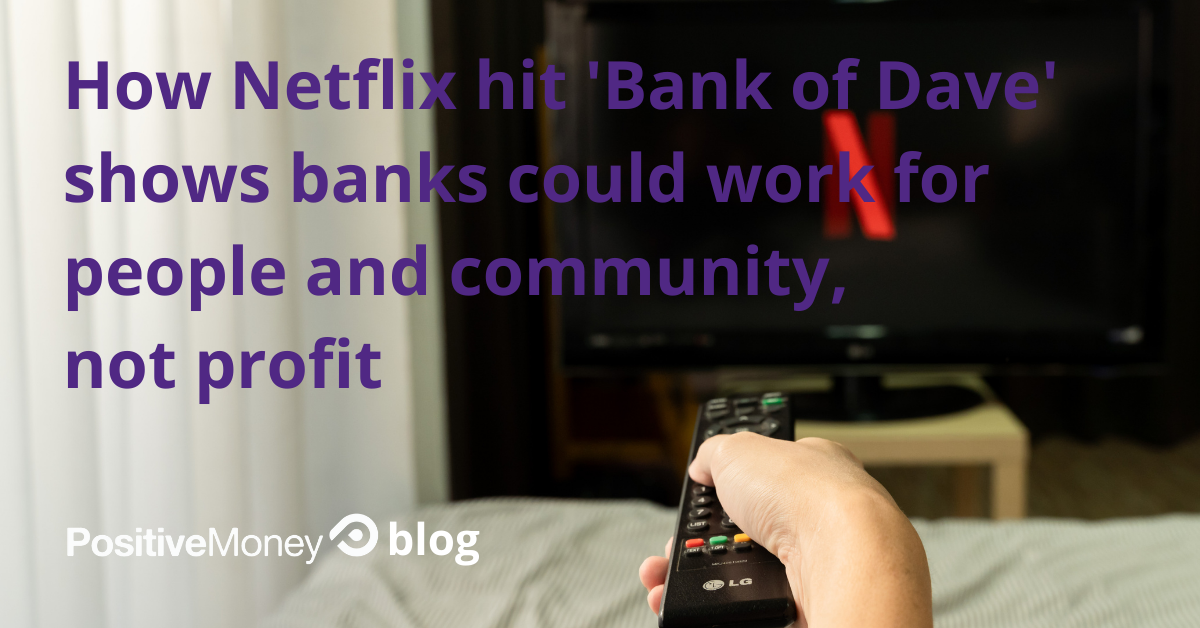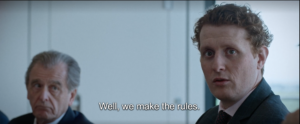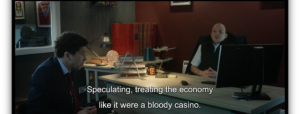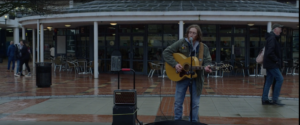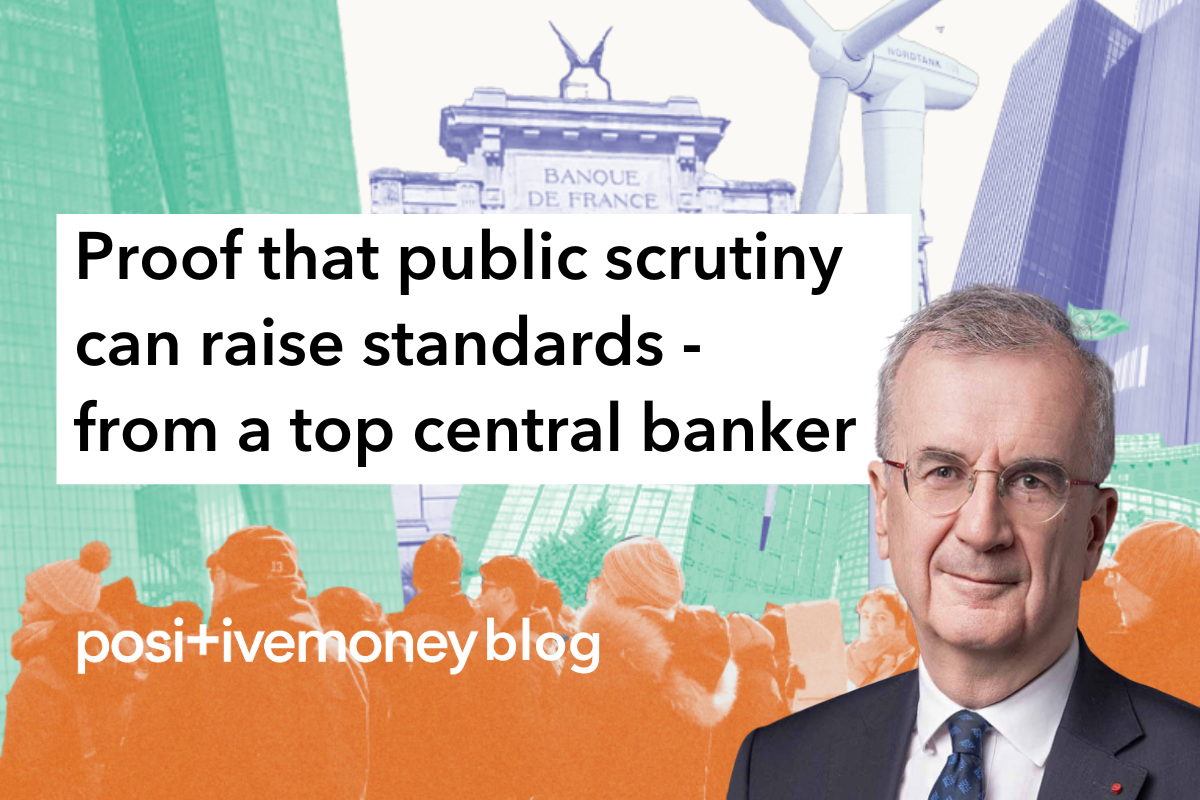
UKEU
18 February 2026
February 22, 2023
“I want them to tell me why. I want them to admit publicly because I’m not in their club. I want them to say the very people who’ve just lost £500 billion quid are the only people entitled to look after our money.” – Dave Fishwick, Bank of Dave
Warning: Please proceed with caution *spoilers ahead*.
Last month, Netflix released Bank of Dave, a ‘true-ish’ story based on minibus seller-turned-lorry seller-turned self-made millionaire, Dave Fishwick. The film follows the trajectory of Dave’s ambition to take on the big banks in the City of London and open the first local bank in 150 years. Now the story is true, Dave Fishwick is a real person, and he really is a businessman who offers loans to people in his local community. The ‘Bank of Dave’ is also in the process of becoming fully regulated in the UK, and currently operates as an independent loans company under ‘Burnley Savings and Loans’.
The film raises some interesting questions for the future of our financial system as at present, big banks are vying for deregulatory legislation post-Brexit to boost profits, propping up the fossil fuel industry, and continuing to receive government handouts whilst profiting off of the cost of living crisis. Despite multiple embellishments within the story to raise the stakes of the plot (what’s a Netflix film without drama?) the concept of an economic system that prioritises green investment, financial inclusion and economic justice are the exact underpinnings of a fair, green economy that we’re striving towards. And despite the flaws in Bank of Dave, it grants us the opportunity to venture beyond the failed economic model that prioritises growth and profit over the wellbeing of people and planet.
Following Dave’s initial application to the Financial Regulation Board (FRB) (the film’s equivalent of the Prudential Regulation Authority) to open a bank, we learn how the board is determined to maintain the prestige and exclusivity of financial services. We’re introduced to the main antagonist, Sir Charles Dengbigh, a former member of the FRB who proclaims, “The FRB exists to make sure that people’s hard-earned money is entrusted to the… right kind of chap.” The police turn up at Dave’s office and arrest him on suspicion of loan sharking. This leads to a dramatic court scene whereby his big shot London-based lawyer, Hugh Stockwell, makes the case that the banks are deliberately undermining his application due to his background and by extension – denying the local community the privilege of a community bank. The judge, unconvinced by the evidence, ends up throwing the case out and the press coverage ramps up even more public support for the ‘Bank of Dave’. With the FRB plan thwarted, rather than use dirty tactics to obfuscate Dave’s plans, they shift their strategy and decide it’s (about) time they ‘play by the rules’, but are confident they still have the upper hand as they are responsible for ‘making them’.
The Financial Regulation Board (FRB) invites Dave to a meeting in London where they allow him to open his bank, on the condition he’s able to raise £12 million in 90 days. In the film, the FRB are portrayed as elitist bureaucrats in the city of London, determined to exclude people like ‘Dave’ from opening a bank. The FRB’s portrayal as the main antagonists of the film is somewhat exaggerated and in reality, Dave only received minor pushback from some bankers in the City (and the real-life PRA have the same requirements for all potential challenger banks). But the financial industry operating as an ‘old boys club’ is based on some truth.
We’ve consistently called out the revolving door, particularly the cosy relationship between finance and politics and last year, Positive Money released a report detailing how MPs and financial institutions are undermining our democracy. The report exposed just how much influence big finance has on our government, with the financial industry spending over £17 million on politicians between 2020 – 2021, with the hope of swaying political decision making and weakening financial regulation. We recently responded to members of the House of Lords supporting the Financial Services & Markets bill – legislation promoting a growth and competitiveness agenda for financial services – whilst simultaneously sustaining lucrative second jobs within financial institutions and lobbying on their behalf.
Right now, banks are recording massive profits from higher interest rates and handouts from the government, but what’s the likelihood of these profits being passed onto the customer? Last week, we released a petition calling on Jeremy Hunt to support a windfall tax on banks – when people up and down the country are being forced to choose between heating and eating, having to rely on food banks, and with the NHS is under enormous pressure, the government should be ensuring banks pay their fair share. A windfall tax on banks could be used to support the most vulnerable, and be redirected towards public infrastructure.
The concept of ‘Bank of Dave’ raises critical questions on the state of banking in 2023 and allows us to envision a banking system that puts the people at the heart of its ethos – not profit. The philanthropic nature of Dave and his loan scheme was highlighted throughout the film as most of the profits went to local charities. This contrasts glaringly with the £1.5 billion Barclays paid out in banker’s bonuses and the £5.1 billion Natwest in profits announced last Friday.
One commendable feature of Bank of Dave was the focus on community organising and wealth redistribution. The film provided social commentary on the socioeconomic disparity between the south and the north of England due to a shift away from labour-intensive industries and a significant lack of investment. This highlights how under-investment in regions outside of London and the South East have been impacted, and neglected by decades of failed government policy. Prior to the 2019 general election, the government promised to ‘level up’ the north and more recently, Prime Minister, Rishi Sunak announced a £2.1 billion levelling-up fund, but was later accused of disproportionately allocating more funding to the south (specifically to his own constituency). And amidst rampant profiteering, banks continue to neglect lending for local businesses or investment in green infrastructure, and have been profiting from people struggling amidst the cost of living crisis. Despite the Bank of England paying higher interest rates to banks, these aren’t being passed on to savers, and it appears only shareholders and bankers themselves are benefitting from Bank of England’s interest rate hikes.
Bank of Dave challenges us to look beyond the rigid ‘for-profit’ banking system that crashed the economy, costing people their jobs and homes, and allows us to envision an economic system that redistributes wealth and supports local people and small businesses. Although the film goes overboard by pushing the benevolent, self-made millionaire trope through Dave’s character – it can be useful to apply the underlying precepts of the ‘Bank of Dave’ to lay the foundation for what community and/or co-operative banking could look like in practice.
Credit unions, community and co-operative banks are successful alternatives to mainstream banks that are driven by social responsibility and have their core principles rooted in empowering their members, encouraging democratic decision-making and fostering community cohesion. The first credit union in the UK was established by Jamaican immigrants in the 1960s to serve the Caribbean community, as Black people often faced discrimination from mainstream banks and predatory lending. Avon Mutual is another example of a regional customer-owned bank providing services for people in the West of England. The bank strives to challenge the monopoly of the 5 biggest banks in the UK, and offer a more stable, sustainable and localised alternative to mainstream banks by serving the unbanked, bolstering financial inclusion. Furthermore, Switchit.Green is raising awareness surrounding how banks are funnelling money into the climate crisis, and offers great resources for people to move their money out of fossil banks into cleaner and greener alternatives.
In the film, we meet Maureen, who was struggling financially after losing her partner. We learn she was the recipient of the very first loan Dave ever gave out, to help cover funeral costs. In another scene, Dave takes his lawyer, Hugh, on a tour of the town and shows him how his loan scheme has sustained people’s livelihoods and got them through difficult times. We learn that he gave the second loan to Jamie, a busker who needed a new amp for his guitar, “But with no bank account, no address, where [were] he supposed to turn?” Dave asks. We learn that Dave purchased a new one and set up a payment plan where Jamie paid him back £2 a week. What’s touching about the film was the genuine compassion Dave shows for people in his community, which heavily contrasts the hostile, sterile and impersonal atmosphere of modern banking today. Dave both lives and works in his community, he has first-hand knowledge of the local economy, the people and has the tools and resources to make transformative change.
In the real world, speaking to your bank has become much more laborious – more and more local bank branches are closing down, as more people switch to online banking services. Some people might not even have a physical bank branch and rely on digital banks like Monzo or Revolut. More broadly, fintech firms have filled a gap in the market, leading to Buy Now, Pay Later (BNPL) services like Klarna becoming more popular, allowing people to spread the cost of purchases. Whilst traditional brick-and-mortar banks have costly interest rates, hidden fees on loans and overdrafts – BNPL firms allow people more flexibility to pay off items in instalments, which is in high demand due to the higher cost of living. The increasing popularity of BNPL highlights how big banks have failed to adequately respond to falling living standards, by making it difficult for people to access affordable credit, especially as strict eligibility criteria often hinder their chances of getting loans. Credit scores are also used to determine people’s eligibility for loans, and these can worsen financial exclusion, with disparate impacts for various race and class identities. This means people from marginalised backgrounds are automatically deemed ‘higher risk’ due to something as arbitrary as their postcode. This reinforces the importance of establishing banks and finance firms that are committed to financial inclusion and economic justice for all.
In Bank of Dave, Dave boasts how he’s given out a million pounds in loans and ‘not one person has defaulted’, and he claims he has created 150 jobs. Despite the film’s portrayal of Dave as the benevolent, working-class, businessman taking on the ‘big, bad banks’ in the city, it’s important to note that there are already a multitude of financial institutions bringing about substantial change to banking from the outset, with strong commitments to financial independence, wealth redistribution and protecting the environment. It’s not surprising to learn that the real Dave Fishwick is capitalising off his wealth and fame to push his own line of credit that perpetuates the cycle of debt that entrenches people into poverty.
Nonetheless, the film allows us to explore a banking model outside the confines of major investment banks in Canary Wharf and to imagine a system where banks are no longer vehicles for the richest to consolidate (and hide) their wealth but instead are used to boost investment all over the country and lead the way in supporting renewable infrastructure. The days of fossil finance are numbered, and a growing movement of climate activists and civil society organisations have been pushing for banks to abandon reckless fossil fuel lending and switch to greener initiatives that can support more safe and affordable public housing, create jobs, and protect the environment. Bank of Dave shows just how out of touch banks are with the communities they claim they represent, but also shines a light on how an economic model that prioritises people over profit is necessary and long overdue.
Positive Money have launched a petition calling on the Chancellor, Jeremy Hunt to support a windfall tax on bank’s profits. Watch our latest video calling out the bank’s massive profiteering and add your name to the petition now.
